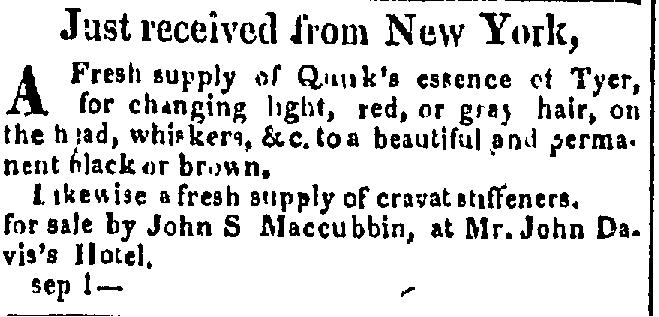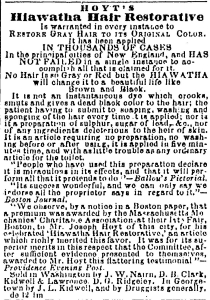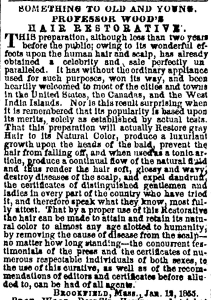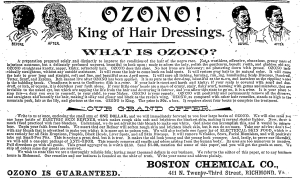Advertising provides a window into the social expectations of times gone by. Advertisements from the past relay the”little” daily needs and wants of generations now but faint memories. The Ancient Egyptians and the Romans dyed their hair, and so did, evidently, Prince Georgeans. Marylanders, and citizens of the District of Columbia.
An advertisement in the form of a poem introduces a book on hair introduces readers to Tyrian Dye warranted to color gray hair.
PRAY what’s the cause Bald Heads appear
When they might be well clothed with Hair
Its length increas d its beauty made Conspicuous in fine curls array d
The Dandriff and the Scurf removed,
And the whole head-piece well approved?
This may he done with ease and little toil
Use only Rowland’s fam’d Macassar Oil
And if the colour’s noxious to the eye
Its chang’d at once hy Rowland’s Tyrian Dye
Grey Hair assumes a new and pleasing hue
And Black or Brown astonishes the view.
Read but his Book in which there are
Both pleasing anecdotes and science rare
You ll at once form due ideas of Human Hair.
[1]
By 1820, the product had reached Washington, D. C.
Just received from New York, A fresh supply of Quirk’s essence of Tyer, for changing light, red or gray hair, on the head, whiskers, &c. to a beautiful and permanent black or brown.[2]
In January of 1855, Professor Wood’s of Brookfield, Massachusetts, offered to the Washington area an all purpose hair restoration product that “will actually Restore Gray
Hair to its Natural Color” as well as provide curative effects to scalp ailments.[3]
Hiawatha’s Hair Restorative claimed in an 1861 advertisement that is was not “an instantaneous dye which crooks, smuts and gives a dead black color to the hair; the patient having to submit to soaping, washing and sponging of the hair every time it is applied; nor is it a preparation of sulphur, sugar, of lead, &c., not of any ingredients deterious to the hair or skin.”[4]
In 1870, Hall’s Vegetable Sicilian Hair Restorer promoted it srestorative properties noting that it was not a dye.[5]
Targeted advertising, promised that it was not a “worthless, offensive, obnoxious, greasy mass of injurious nostrums” and it would cause “hair to come back on bald spots” as well as restoring gray hair to natural color.[6]
“Try it!”, the 1913 ad reads, “sage tea darkens and beautifies faded gray hair. Mixed with sulphur makes hair soft and luxuriant and removes Dandruff. The old-time mixture of Sage Tea and Sulphur for darkeing gray, streaked and faded hair is coming in vogue again.”[7]
100 years the sage and sulphur remedy for gray hair stood the test of time. Are you ready to try it?
[1] Alexander Rowland. 1814. A practical and philosophical treatise on the human hair. J. Evans & Son. Smithfield. UK.
[2] Washington Gazette. District of Columbia. 09-01-1820. Page [3].
[3] Evening Star. District of Columbia. 02-05-1856 Page [4]
[4] Evening Star. District of Columbia. 01-03-1861 Page [1].
[5] The Evening Star. District of Columbia. 02-12-1870. Page [1].
[6] The Colored American. District of Columbia. 05-26-1900 Page [16].
[7] The Sunday Star. District of Columbia. 01-19-1913 Page [65].





Leave A Comment